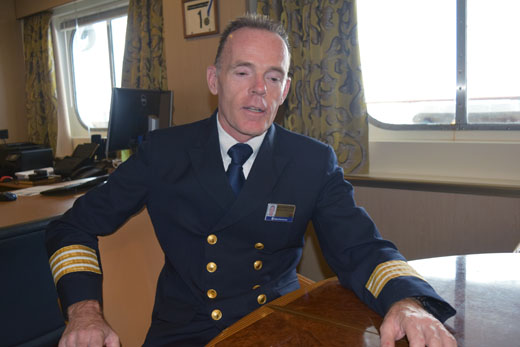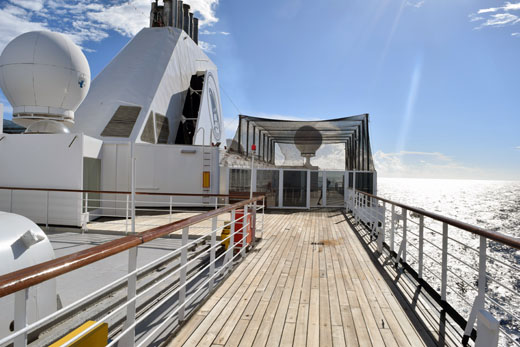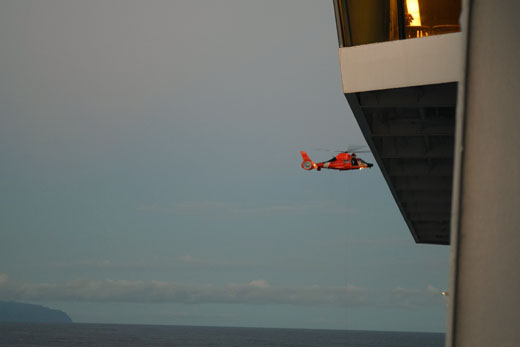
Editor’s Note: This is the tenth in a series of stories researched during Don and Nancy Harrison’s 50th Wedding Anniversary cruise from Sydney, Australia, to San Diego. Previous installments of the series, which runs every Thursday, may be found by tapping the number of the installment: 1, 2, 3, 4, 5, 6, 7, 8, 9
By Donald H. Harrison

AT SEA, Aboard MS Maasdam – Two days at sea between Burnie, Tasmania, and Fjordland National Park in New Zealand provided me with the leisurely opportunity to start getting to know some of the officers, crew, and entertainers aboard this 1,200-passenger Holland America cruise ship. To start it off, I sat down with Bert Van Mackelenbergh, the ship’s very trim hotel manager, for whom his career at sea has proven a wonderful way to find new venues to run in marathons, half-marathons, and ultra-marathons.
I was lucky to find him seated in his office, because when official business is not at hand, he typically is in motion, either running as many as 320 laps a day around the sports deck, or putting in virtual mile after mile on a treadmill. He prefers the former mode of locomotion, but when it is too windy up on the 12th deck of the ship, he resorts to the treadmill to stay in his very good shape.

I couldn’t help but contrast Van Mackelenbergh’s lean runner’s body with so many of the rest of us on the cruise ship, who are likely to over-indulge ourselves on the food that is ever-present in the restaurants, on the Lido Deck, and just a call away with room service. I asked Van Mackelenbergh if he eats only healthy foods, and he shook his head, ‘No.’ In fact, he said, he has a weakness for sausages, which he likes to make himself. Right now, he is between homes—the Maasdam being his current domicile. At his last land-based home in the Las Vegas suburb of Henderson, Nevada, he said, “I designed the house, based on the galley. I had so much equipment in the kitchen and one of the nicest things for me to do is to grind my own beef, grind my own pork, and to have all the spices to make different sausages. For me that is such a great thing—you have 500 different sausages, with the whole curing process and the different flavors. It’s not the healthiest thing to eat, but I run it off.”
I asked if he is one who can eat anything. No, he responded, adding that he exercises portion control while severely limiting the amount of sugar in his diet.
In the two days prior to our interview, Van Mackelenbergh ran a half-marathon in Melbourne, then turned around and ran another half-marathon in Burnie. At that kind of pace, it is easy to understand how his total of half-marathons already run is nearing 2,000, and full marathons getting close to 600. Beyond that, he participates in what he calls “extreme running events” such as a 100-mile run from a point southwest of Salt Lake City over the old Pony Express route. He also has run in places like Death Valley and the Grand Canyon, explaining that he is “obsessed with deserts.”
He was raised in a southern part of Holland, near the Belgian border. His parents both were managers for Hilton International properties, and he followed them into the hotel business, working both in Holland and Germany before deciding to move to Aruba, a Dutch island in the Caribbean, where he eventually ran all the dining facilities at a holiday resort.
However, he said, “After about seven years you get a little bored. Aruba is not the largest island; it takes about two hours to run from north to south and one hour to run from east to west, so it is small. One day, I woke up and thought, ‘Enough is enough! I am going to move to another continent’ and that was South Africa. I packed up everything into a container and had it shipped to South Africa.” Before moving to the United States, he lived some 17 years in the Stellenbosch wine region, about 30 miles east of Cape Town. It was during this period that he made the switch from land-based hotels to those on the water.
Logistics are the main difference between running a hotel on land and one on sea. On the Maasdam, Van Mackelenbergh supervises about 530 people – everyone who is not on the navigation or technical staffs. That includes the waiters, cabin stewards, bar attendants, cruise staff, entertainers, and the people who run such operations as the laundry, storage of provisions, and the kitchens.
“The most challenging aspect is getting everything to where it has to be on time,” he said. “Mainly we are talking about food supplies. Most of the ports in the South Pacific have no facilities for supplying such large quantities, so all these containers with fruit and vegetables need to come from San Diego [where many Holland America ships home port.] You can imagine, it is such a long stretch to sail from San Diego to the Cook Islands or to Moorea [in French Polynesia]. So, there is a specific time table ordering to get your containers from San Diego to Papeete [Tahiti], and some fruit and vegetables from Auckland [New Zealand] to Papeete. That which we receive from San Diego has to be ordered at least three months before hand. Just now, I have ordered what we will need on the ship five months from now. This is always a challenge.”
In some exotic ports, such as in Africa, for example, when the ship has to receive supplies, “You need to deal with customs, agriculture, immigration, and so forth, and it can be a logistical nightmare, not just receiving the provisions but also going through the whole clearance process. We’ve had times that the containers were standing there in port, you could see them, but they hadn’t been cleared yet, so we had to leave them behind, and have them sent to the next port, where we’d deal with the same kinds of issues.”
Besides getting food onto the ship, it can be a giant logistical challenge to get crew members or passengers off the ship in the event of a medical or family emergency.
“If one of our guests, or crew, experience a medical emergency when we are underway, we only have a few options, to turn around and go back, and perhaps miss the next port of call, or a helicopter is sent,” Van Mackelenbergh said, presaging what would happen later in the cruise after the ship left Hawaii on its final leg to San Diego. A woman fell in her cabin, hitting her head, and the ship had to turn around to rendezvous at a point 75 miles off the Hawaiian coast with a Coast Guard helicopter. That was the maximum distance that helicopter could travel, given its fuel requirements. Luckily, the ship was able to make up the time back to San Diego.

“For land-based hotels it is much easier,” said Van Mackelenbergh. “You just call 9-1-1 and they send an ambulance.” Furthermore, sometimes Holland America must deal with situations in which crew members learn that their parents have passed away back home, perhaps in Indonesia or the Philippines, the two countries that are native for many members of his staff. “You have to try to get them back home ASAP, which of course we do. We send a crew member home for at least two weeks, but it is not always easy to get them from Point A back home. You have to deal with immigration issues, and sometimes it is not allowed at the closest port. So, we have to deal with all those restrictions.”
Travel connections also can be difficult from distant ports. When Van Mackelenbergh’s own father died last year, “I was in Cook Islands, and I had to fly to Auckland, then to Dubai, and then on to the Netherlands.”
Van Mackelenbergh said that as a hotel manager, he needs to be well aware months before a given cruise what kind of national or ethnic groups may be coming aboard. For example, if half the passengers will be coming from Germany, or the Netherlands, different kinds of entertainers will be needed than what might be perfect for American passengers. Even if they speak English, many European travelers will not understand the jokes in an American stand-up comic’s routine, he said. Additionally, a German- or Dutch-speaking cruise director might also be hired for such a group.
Additionally, large groups may require special foods. When sailing from Vancouver to Asia, he said, he knows that he will have to have a chef aboard familiar with Indian cooking. And when there are large groups of Jews aboard—say for Passover or for Chanukah—special arrangements need to be made to kasher the kitchen, provide hagaddahs and special seder foods for Passover, or latkes and fried doughnuts for Chanukah.
He said he has attended several seders over his years with Holland America, and demonstrated that by singing a chorus of “Dayenu.”
When observant Jews travel independently, he said, they have the choice of eating meals prepared aboard that are pareve, or having the ship load aboard kosher dinners prepared by an outside contractor, dinners “which we just heat up.”
In fact, on this cruise, we met one observant couple from New York who tried the packaged kosher dinners, which they found unappetizing. They switched to the vegetarian selections provided by the ship, and were quite happy for the rest of the cruise.
Crew members are hired by outside agencies following guidelines established at Holland America’s headquarters in Seattle, Washington, and not by the hotel managers aboard the company’s fleet of ships. More important than hotel or dining room experience, said Van Mackelenbergh, is “attitude—I can teach someone where to set a fork or a knife, but I can’t teach them how to be happy or friendly. That is something that comes with your personality.”
He preaches to front-line personnel that even if they have personal problems, “That should not be a problem for the guests. If I am on vacation as a guest, I don’t need to know any of your problems.”
Van Mackelenbergh takes particular pride in those cruise ship personnel who go above and beyond in their duties.
“Some of those dining room stewards are so good at remembering names; they remember guests from five, six, seven years ago by name,” Van Mackelenbergh said. “Some of them are even able to remember what they liked to order. We had one person a couple of years ago, a steward, who within 24 hours would know every single guest [within his jurisdiction] by name.” Van Mackelenbergh said he asked the steward his secret, as he also would like to have that skill, but the steward just said, “every guest has something specific.”
A favorite incident came when a five-year-old boy lost his tooth, and his parents were talking on the gangway about his hoping the tooth fairy would come and visit him. A crew member who overheard the conversation, “went to the room, put chocolate under the boy’s pillow, along with a note from the tooth fairy. The kid was so happy – and these are the things that are so easy to do.”
*
Harrison is editor of San Diego Jewish World. He may be contacted via donald.harrison@sdjewishworld.com
Pingback: Route to New Zealand was a sound decision | San Diego Jewish World
Pingback: Jewish tradition of the arts in Dunedin | San Diego Jewish World